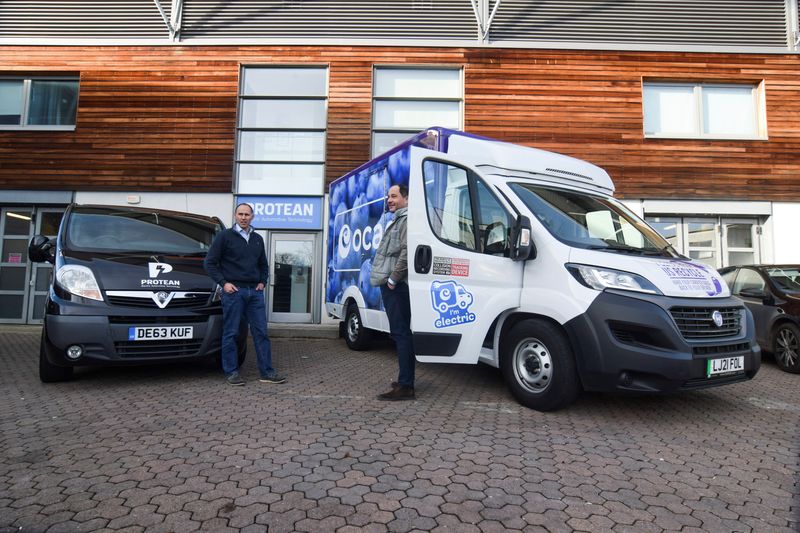EV startups hunt for an edge as big automakers roll out vans and
[ad_1]

© Reuters. Andrew Whitehead, CEO of Bedeo’s unit Protean, which makes in-wheel electric motors, stands with Osman Boyner, CEO of EV maker Bedeo, in front of a Bedeo van operated by Ocado and a black fossil-fuel van Protean which has been converted to electric using
2/5
By Nick Carey and Ben Klayman
FARNHAM, England (Reuters) – As traditional automakers prepare to churn out electric vans and trucks, startups are focused more than ever on finding a competitive or technological edge to stay on the road once their bigger rivals start moving through the gears.
Spurred on by looming bans on combustion engines in China and Europe, major automakers are striving to bring their commercial electric vehicles (EV) to market fast and ensure they don’t get caught out again by another Tesla (NASDAQ:).
To survive in a world where the likes of General Motors (NYSE:), Ford, Renault (PA:) or Stellantis can make hundreds of thousands of vans a year, superior software or technology could make all the difference for newer entrants.
“The startups all bring something to the party,” says Jean-Michel Renaudie, senior vice president for industrial and commercial transportation at auto supplier TE Connectivity (NYSE:). “The question is, what’s your unique selling point?”
For British EV startup Bedeo, the answer changed last year due to an unexpected turn of events.
When property developer China Evergrande Group ran into debt trouble, its National Electric Vehicle Sweden (NEVS) subsidiary put in-wheel electric motor startup Protean Electric on the block – and Bedeo bought it.
Up until then, Bedeo had been turning vans such as Peugeot (OTC:)’s Boxer and Opel’s Movano into EVs for Stellantis by adding electric motors, batteries and operating system at a factory in Turkey. It was also selling its own electric vans to customers such as FedEx (NYSE:)’s TNT and Deutsche Post (OTC:)’s DHL.
Now, Bedeo and Protean plan to develop new EV platforms for commercial vehicles and passenger cars using in-wheel motors, Bedeo Chief Executive Osman Boyner told Reuters.
In-wheel motors – stand-alone electric motors that can be housed in all or some the wheels of an EV – don’t need axles and powertrains so they free up more space inside vans and trucks, as well as extend battery range by reducing vehicle weights.
At Protean’s headquarters in Farnham outside London, Chief Executive Andrew Whitehead shows off a production-ready sports car developed under NEVS with in-wheel motors that has a range of 1,000 km (620 miles), far greater than EVs available now.
“Every vehicle some day will have in-wheel motors because it’s a no-brainer,” Boyner said. “We already have this technology on the road and now we just have to market it.”
‘GORILLA IN THE MARKETPLACE’
The stakes are high. About 9 million delivery vans are sold worldwide each year and with global distribution and retail companies under increasing pressure to go green, bumper commercial EV orders are set to come thick and…
[ad_2]
Read More: EV startups hunt for an edge as big automakers roll out vans and
